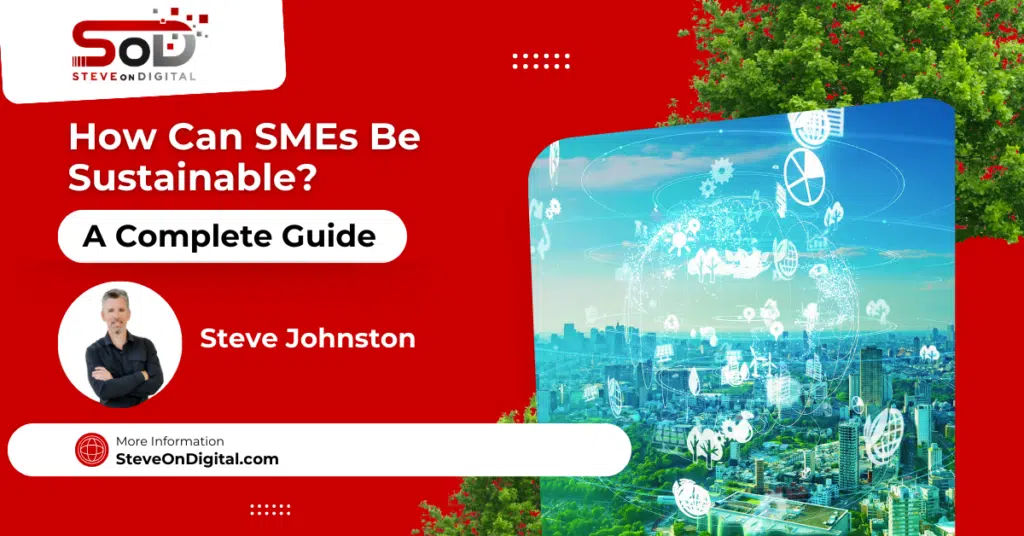How Can SMEs Be Sustainable? | A Complete Guide

Hello there! I’m Steve Johnston, the mind and hands behind SteveOnDigital. Today, we’re diving into a topic close to my heart and crucial for all of us running small and medium-sized enterprises (SMEs): sustainability. Having navigated the digital landscape and seen first-hand the shifts in consumer behavior and regulatory demands, I’ve grown increasingly committed to steering businesses towards sustainable practices. Let’s explore how SMEs like ours can not only thrive but do so responsibly. Addressing environmental and social challenges is fundamental for SMEs, emphasizing the global importance of our role in sustainability and the fight against climate change. Why Sustainability Is Crucial For SMEs In our world today, sustainability is no longer a nice-to-have; it’s a must-have. As an SME owner, I’ve observed a significant uptick in both the challenges and opportunities presented by adopting sustainable practices. Here’s why it’s essential: Let me share a bit of data to back this up. Reports suggest that companies committed to sustainable practices report up to 20% higher profitability compared to those that aren’t. Moreover, 50% of consumers worldwide are willing to pay more for goods and services from companies committed to positive social and environmental impact. Laying The Groundwork For Sustainable Business As the owner of SteveOnDigital, I’ve committed myself and my business to understand and implement sustainable practices, a journey that’s both challenging and rewarding. Here, I’ll break down what sustainability really means for us, small and medium-sized enterprises (SMEs), and how we can lay the groundwork for a greener future. It’s crucial for SMEs to incorporate sustainability into their operations as a step towards a more sustainable and responsible business model. What Is Sustainability In Business? For SMEs, sustainability is about operating in a manner that ensures long-term economic performance, environmental health, and social equity. Here are some key concepts: SMEs As Catalysts For A Sustainable Economy SMEs like ours play a vital role in the global economy, accounting for a significant portion of employment and economic activity. Here’s how we can be catalysts for change: Challenges On The Path To Sustainability Despite our best intentions, the road to sustainability is fraught with challenges: Navigating Global Supply Chain Sustainability Managing a sustainable supply chain is crucial for reducing our environmental footprint. Here are a few strategies I’ve learned and implemented in my business: By understanding these foundational aspects, SMEs can start to make informed decisions that align with both business goals and environmental needs. Strategic Implementation Of Sustainable Practices As we continue our journey into sustainability, it’s crucial to translate our commitment into actionable strategies. Here’s how we, as a medium-sized enterprise, have been embedding sustainable practices into our daily operations and planning for the long term. These steps aren’t just theoretical; they’re practical changes that have truly transformed how we do business. Embracing responsible business practices is essential in demonstrating our commitment to sustainability, attracting environmentally conscious customers, and making a positive impact on society and the planet. Aspect Traditional Practice Sustainable Practice Benefit of Sustainable Practice Energy Use of fossil fuels Adoption of renewable energy Reduces emissions and energy costs Waste Management Disposal in landfills Recycling and composting Minimizes environmental impact Supply Chain Global sourcing Local sourcing Reduces transport emissions, supports local economies Advancing Renewable Energy And Efficiency In our pursuit of sustainability, one of the first steps was to reduce our energy consumption. This isn’t just about being eco-friendly; it’s also about being economically savvy. Here’s how we’ve been making it happen: Achieving Waste Reduction And Promoting Recycling Waste reduction is another critical area where we’ve focused our efforts. Here’s what we’ve done: Community Engagement And Localized Strategies Sustainability is as much about people as it is about the planet. Here’s how we engage with our community: Economic Advantages Of Sustainable Practices Let’s talk numbers, because sustainability isn’t just good for the planet—it’s great for business too. Here’s what we’ve observed: Monitoring And Evaluating Sustainability Impact As we dive deeper into making SteveOnDigital a paragon of sustainability, it’s crucial not just to implement sustainable practices but also to monitor and evaluate their impact. Here’s how we can effectively measure and keep tabs on our sustainability performance. Incorporating sustainable initiatives is essential for tracking and reinforcing sustainability efforts within businesses, highlighting the importance of a dedicated approach to ecological transition and the benefits it brings to both the environment and the economy. Using Sustainability Metrics And Standards To truly gauge the effectiveness of our sustainability efforts, we rely on specific metrics and standards that give us a clear picture of our impact. Here’s how we approach this: Metric Description Carbon Footprint Total amount of greenhouse gases produced, measured in CO2 equivalents. Energy Efficiency Energy usage relative to output, aiming for lower ratios. Waste Reduction Percentage reduction in waste produced compared to a baseline year. Water Usage Total water consumption, with goals to reduce usage over time. The Importance Of Sustainability Certifications Sustainability certifications are more than just badges for a business; they’re a testament to our commitment and compliance with global standards. Here’s why they’re essential: Leveraging Support From Financial Institutions Sustainability isn’t just a cost center; it’s also an area where we can gain financial advantages through support from eco-minded financial institutions. Here’s how we benefit: Incentive Type Description Potential Benefit Green Bonds Bonds specifically intended for climate or environmental projects. Access to cheaper capital for sustainability projects. Government Grants Funds provided by government bodies for eco-friendly upgrades. Non-repayable funding to support transition to green operations. Tax Breaks Reductions or exemptions in taxes for sustainable practices. Lower operational costs and encouragement for green investments. By keeping a close eye on these metrics and leveraging the support systems available, we not only stay true to our sustainability goals but also ensure that our business remains viable and competitive in a rapidly evolving market. This approach not only supports SteveOnDigital in its green mission but also serves as a blueprint for other SMEs striving to make a difference. Gaining A Competitive Edge Through Sustainability We’ve seen firsthand how

